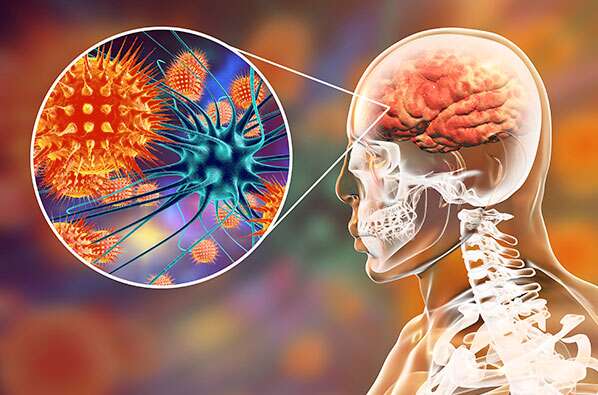What Is Encephalitis?
Encephalitis is an inflammation (swelling and irritation) of the brain. In most cases, a virus causes this inflammation. Sometimes it can also be associated with inflammation of the lining of the brain (meninges), such cases are called meningo-encephalitis and can be caused due to bacterias or viruses.
What are the symptoms of Encephalitis?
Symptoms in mild cases of encephalitis usually include:
- fever
- headache
- poor appetite
- loss of energy
- a general sick feeling
- drowsiness
Serious cases of encephalitis can cause:
- a high fever
- severe headache
- nausea and vomiting
- stiff neck
- confusion
- personality changes
- convulsions (seizures)
- problems with speech or hearing
- hallucinations
- memory loss
- drowsiness
- coma
It’s harder to spot some of these symptoms in infants. Important signs to look for include:
- vomiting
- a full or bulging soft spot on the top of their head (fontanel)
- crying that doesn’t stop or that seems worse when the baby is picked up or handled
- body stiffness
- poor feeding
- excessive drowsiness
What causes Encephalitis?
Three groups of viruses are common causes of encephalitis:
- Herpes viruses, such as chickenpox, EBV (Epstein-Barr virus, which causes glandular fever), and herpes simplex (which causes cold sores).
- Viruses and other germs transmitted by insects like mosquitoes, like Dengue, Malaria, Japanese encephalitis, Chandipura and Chikungunya.
- Viruses that cause common childhood infections and are vaccine preventable, such as measles, mumps, and rubella. Thanks to immunizations, it’s rare today for someone to develop encephalitis from these illnesses.
Less often, encephalitis can be:
- caused by an infection from bacteria , such as bacterial meningitis
- due to a parasite, like toxoplasmosis (found in infected cat faeces) in people with weakened immune systems
Is Encephalitis contagious?
Brain inflammation itself is not contagious. But the viruses that cause encephalitis can be. Of course, getting a virus does not mean that someone will develop encephalitis.
How is Encephalitis diagnosed?
A high index of clinical suspicion is required to clinically diagnose encephalitis and often doctors would start treatment in suspected cases. Doctors use several tests to diagnose encephalitis, including:
- imaging tests, such as computed tomography (CT) scans or magnetic resonance imaging (MRI), to check the brain for swelling, bleeding, or other problems
- electroencephalogram (EEG), which records the electrical signals in the brain, to check for unusual brain waves
- blood tests to look for bacteria or viruses in the blood. These also can show if the white cell counts are raised or there are other chemicals to prove that the body is mounting a response to fight the germs
- lumbar puncture, or spinal tap, which checks cerebrospinal fluid (the fluid that surrounds the brain and spinal cord) for signs of infection. This is a very important test which can not only prove the diagnosis but in many cases caused by bacteria can also help identify which medications (antibiotics) would work agains the germ. Parents are often worried about this test and the discomfort it would cause their child, however pediatricians are experts in doing this test. In addition, this would not lead to any long term problems (back pain or difficulty walking), nor will it damage any structures like the spinal cord or nerves.
How is Encephalitis treated?
Most children with encephalitis need care in a hospital, usually in an intensive care unit (ICU). Doctors will watch their blood pressure, heart rate, breathing, and body fluids to prevent further swelling of the brain.
Medicines
- Antiviral drugs can treat some forms of encephalitis, such as the type caused by the herpes simplex virus.
- Steroids may be used to reduce brain swelling.
- Anticonvulsants might be given to a child having seizures.
- Paracetamol can help with fever and headaches.
- Antibiotics don’t work against viruses, so aren’t used to treat most forms of encephalitis. But in suspected cases due to bacteria, they are usually given.
- Fluids or feeds to maintain optimal hydration and blood sugar.
Many people with encephalitis make a full recovery. In some cases, brain swelling can cause lasting problem like learning disabilities, speech problems, memory loss, or lack of muscle control. Speech therapy, physical therapy, or occupational therapy can help in these cases.
How long does it take to recover?
Most of the time, the acute phase of the illness (when symptoms are the most severe) lasts up to a week.Treatment can vary from 3 weeks, to sometimes longer in selected cases. Sometimes, the doctors would request a repeat lumbar puncture to ensure that the fluid surrounding the brain is completely clear before stopping the treatment. Full recovery can take longer, often several weeks or months.
Can encephalitis be prevented?
Encephalitis can’t be prevented, but you can avoid the illnesses that may lead to it. Immunizations protect kids from many common childhood illnesses, so follow the immunization schedule recommended by your doctor. Kids should also avoid contact with anyone who already has encephalitis. It’s also important for everyone in your family to wash their hands well and often.
To avoid mosquito bites, kids should:
- Avoid being outside at dawn and dusk, when mosquitoes are most active.
- Wear protective clothing outside, like long sleeves and long pants.
- Use insect repellent.
- Drain standing water from around your home, including in buckets, birdbaths, flowerpots, and tire swings. These are breeding grounds for mosquitoes.
When should I worry about my child having possible encephalitis?
Call your doctor if your child has a high fever, especially if he or she also has a childhood illness (like measles, mumps, or chickenpox) or is recovering from one.
Get medical care right away if your child has any of these symptoms associated with fever:
- a severe headache
- convulsions (seizures)
- stiff neck
- can’t look at bright lights
- double vision
- trouble walking or moving a hand or leg
- problems with speech or hearing
- sudden personality changes or memory problems
- extreme drowsiness
- crying that wont stop
- vomiting or poor ortal intake


